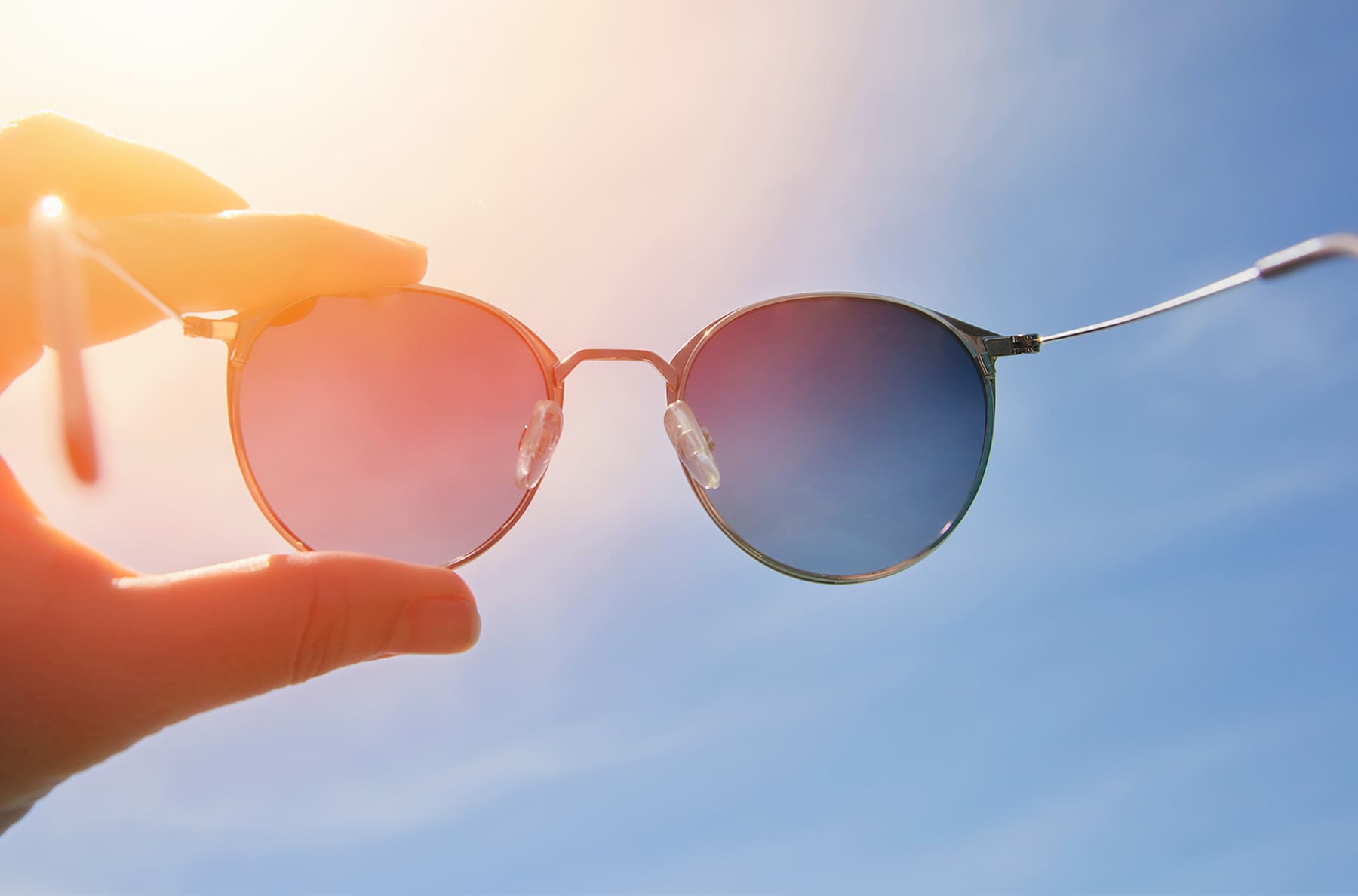Reviewed By Dr. Jodi Kuhn
Reading time: 5 minutes
Polarized sunglasses reduce glare, but they do not automatically block UV rays. If you are relying on them for eye protection, make sure they are labeled for 100% UV protection.
In this blog, you will learn the difference between polarized and non-polarized sunglasses, whether polarization helps protect your eyes, and how to choose the right lenses for driving, outdoor activity, and UV safety.
Youth Vision provides comprehensive vision care for kids and adults at our locations in Denver, Aurora, Hampden and Thornton.
Table of Contents
Key Takeaway
Polarized sunglasses do not automatically block UV rays. If you are buying a new pair of sunglasses, make sure they offer 100% UV protection, with or without polarization. Polarized lenses improve visual clarity and reduce glare, but only sunglasses with UV protection will keep your eyes safe from harmful ultraviolet exposure.
What Does Polarization Actually Do?
Polarized sunglasses use a special coating that filters out horizontal light waves, the ones that bounce off reflective surfaces like water, car hoods, or pavement.
Here is how they help:
- Reduce glare: Especially useful around snow, water, and flat surfaces.
- Improve visibility: You see more detail, especially in bright light or high-glare settings.
- Ease eye fatigue: Less squinting leads to more comfortable vision outdoors.
But, and this is key, glare is different from ultraviolet light. Polarized lenses do not block harmful ultraviolet radiation unless the sunglasses are specifically rated for it.
Do Polarized Sunglasses Block UV Rays?
Not by default. Polarization and UV protection are two separate features.
- Polarization = glare control from horizontal light
- UV protection = blocks harmful ultraviolet radiation that causes long-term eye conditions
You need both. The best pair of sunglasses for eye health are labeled with:
- “100% UVA and UVB protection”
- Or “UV400” (blocks UV radiation up to 400 nanometers)
If your polarized lenses do not include UV protection, your eyes could still absorb dangerous rays, even while the view seems clearer and brighter.
Do I Need Polarized Sunglasses?
If your primary goal is to protect your eyes from UV damage, UV protection is non-negotiable. But if you spend time in glare-heavy environments, like driving in bright light, hiking, or water sports, then polarized lenses offer valuable benefits.
Here is who benefits most:
- Drivers: Glare from wet roads or other vehicles can reduce visibility. Polarized sunglasses improve visual clarity and help keep eyes safe.
- Outdoor athletes: Runners, golfers, and skiers benefit from sharper contrast and less strain.
- Water lovers: Polarized glasses reduce glare from flat surfaces like lakes, rivers, and pools.
- Kids and teens: Young eyes are more sensitive to UV radiation and more vulnerable to long-term damage like macular degeneration or ocular cancer.
Are Polarized Sunglasses Better for Driving?
Polarized lenses reduce harsh reflections from:
- Wet asphalt
- Car windshields
- Bright, low-angle sunlight
This helps maintain central vision, improves visual clarity, and enhances contrast. However:
- Some LCD screens, including dashboards and GPS units, may appear dim or distorted through polarized lenses.
- Night driving does not benefit from polarization; clear anti-reflective glasses with UV protection lenses are better suited.
For daytime driving, a pair of polarized sunglasses with UV lenses is one of the best options available.
What About Non-Polarized Sunglasses?
Non-polarized sunglasses can still protect your eyes, as long as they have UV protection. Some people prefer non-polarized lenses for tasks involving LCD screens or when vertical light is more relevant.
They may be a better choice for:
- People who are sensitive to the distortion polarized lenses sometimes create
- Individuals working in shaded or indoor environments with limited glare
If you want to protect your eyes from sun damage but do not face heavy glare, non-polarized sunglasses with proper UV protection offer a solid level of protection.
| How to Tell If Your Sunglasses Protect Against UV RaysIt’s easy to assume that tinted lenses block UV rays, but that’s not always the case. Unless your sunglasses specifically mention UV protection, they may be letting harmful rays through. If you are not sure, an optician can quickly check them for you and recommend a pair that keeps your eyes safe in the sun. |
Pro Tips for Safer Sun Days
Sunglasses do more than cut glare. They help protect your eyes and the delicate skin around them from long-term UV damage. Keep these tips in mind before you head outside:
- Choose wraparound or oversized frames: These help block UV rays from reaching your eyes from the sides.
- Start early: Wearing UV-protective sunglasses at a young age can lower the lifetime risk of macular degeneration and ocular cancer.
- Replace scratched lenses: Surface damage can reduce the effectiveness of UV protection.
- Remember your skin: Sunglasses also help reduce the risk of skin cancer in the area around your eyes.
Book an Eye Exam at Youth Vision
At Youth Vision, we help families choose eye doctor-approved sunglasses that offer both comfort and safety.
Whether your child needs their first pair or you are updating your own for summer driving, we will help you find the perfect fit.
Schedule a comprehensive eye exam at any of our locations:
- Denver Youth Vision, located at 1400 Grove Street, Denver, CO 80204, 303-825-2295
- Aurora Youth Vision, located at 14251 E. 6th Avenue, Aurora, CO 80011, 303-343-3133
- Thornton Youth Vision, located at 9674 Washington Street, Thornton, CO 80229, 303-953-880
- Hampden Youth Vision, located at 7400 East Hampden Ave. Unit C1, Denver, CO 80231, 720-866-9906


